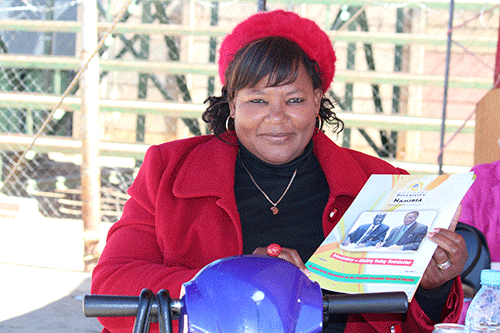When a baby is born deaf, the whole family needs to learn sign language, but it should not be limited to only the family unit; services must be in place to provide sign language learning and support to anyone.
Deputy minister of disability affairs Alexia Manombe-Ncube said this while tabling a motion in parliament recently, calling for the recognition of Namibian Sign Language as a national language, and the appointment of sign language interpreters.
She said the acquisition of sign language skills is critical for the cognitive and social development of deaf children, adding that deaf people have their own identity, mainly tied to sign language and social connections, built on the shared experience of the use of these languages.
“Sign language and deaf culture strengthen multilingualism, and they are means of promoting, protecting and preserving the diversity of languages and cultures globally, including in Namibia,” the deputy minister noted.
Currently, Namibia has one official language – English, and it has several languages recognised as national languages.
Oshikwanyama, Oshindonga, Rukwangali, Otjiherero, Rugcirriku, Silozi and Setswana all belonging to the Bantu language group, and Khoekhoegowab and Ju/hoan belonging to the Khoisan language group – they are among the indigenous languages.
English, German and Afrikaans are the three Indo-European languages.
Manombe-Ncube said deaf communities are part of a unique inter-sectionality of rights, belonging to both linguistic and cultural groups, as well as the disability movement.
Sign language and deaf culture thus strengthen multilingualism, and they are a means of promoting, protecting and preserving the diversity of languages and cultures globally, including in Namibia.
Sign language is a legitimate language with its syntax, morphology and structure. It is capable of functioning as a language of communication in all settings – from educational to political contexts, the politician added.
In July 2023, South Africa became the fourth African state to recognise sign language as an official means of communication after Kenya, Uganda and Zimbabwe.
President Cyril Ramaphosa signed into law the South African Sign Language Bill to address access to education, economic and other social opportunities, as well as public participation.
Ramaphosa believes, “By making sign language official, we aim to advance their rights to substantive equality, dignity and also their social inclusion. To empower people to use their language is to affirm their humanity”.
Executive director of the Namibian National Association of the Deaf Linekela Nanyeni stated that instruments, such as the Persons with Disability Bill, should aim to be inclusive and cater to the diverse needs of all individuals with disabilities, including the deaf.
He added that for the deaf community, this could involve provisions for sign language interpretation, closed captioning and accessible technology.
He added that persons with disabilities will also see some changes, which will positively position them into active participants in the decisions, economy and other social engagements.


